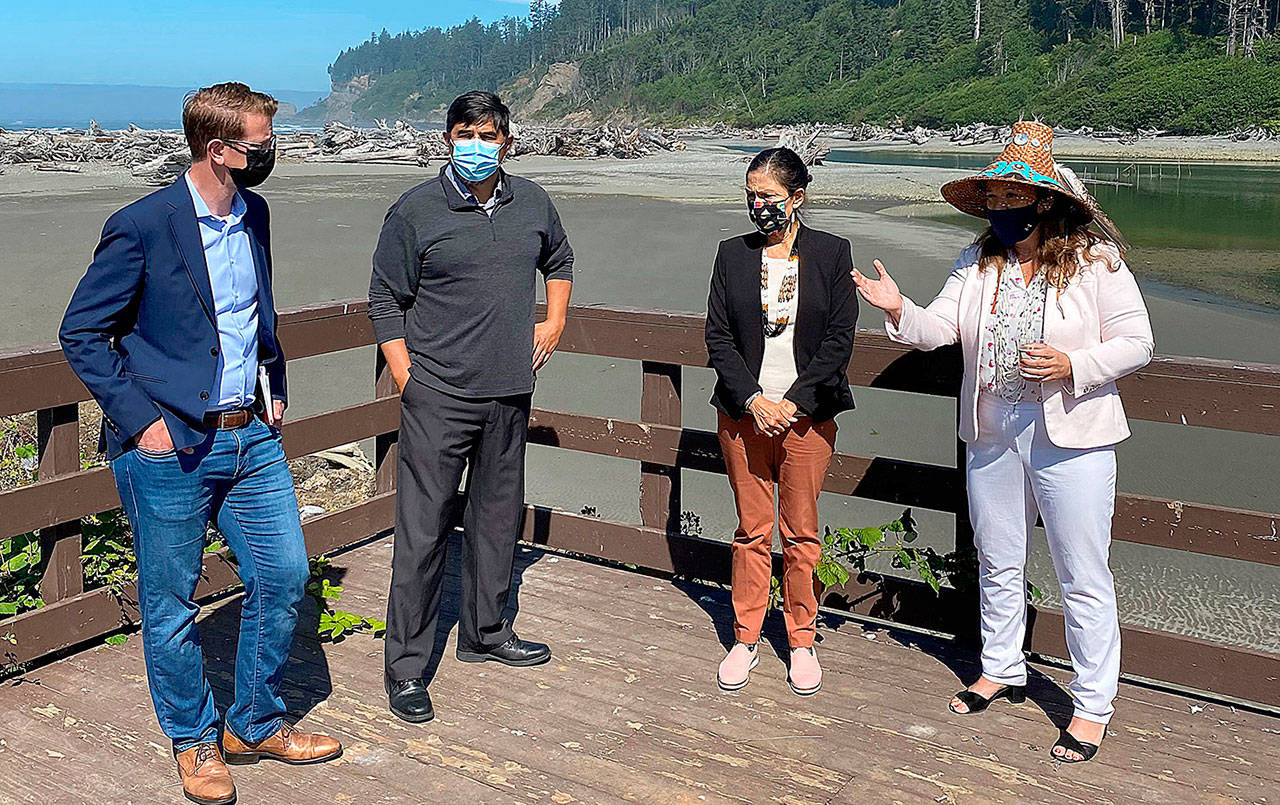Secretary of the Interior Deb Haaland — the first-ever Native American to serve in a U.S. cabinet post — traveled to Taholah on Monday where she discussed federal investments in tribal communities, including funding for climate resilience projects and broadband internet access.
While visiting the Quinault Indian Nation, she and U.S. Rep. Derek Kilmer met with leaders of the Quileute, Hoh, Makah, Lower Elwha Klallam, Jamestown S’Klallam, Port Gamble S’Klallam, Suquamish, Skokomish, Squaxin Island, Chehalis, and Puyallup tribes.
The group toured the Village of Taholah; the Quinault Indian Nation is in the process of relocating the village to higher ground.
“We’ve seen homes and community centers in Taholah face water damage. We’ve seen the Quileute Tribal School in La Push be in the crosshairs of a rising ocean. We’ve seen coastal challenges threaten public safety, public access, and cultural landmarks for these tribes and others, including the Hoh and Makah Tribes,” said Kilmer.
“Each of these communities are working to move to higher ground, and that’s why I’m working to ensure the federal government takes action to provide tribal communities with direct access to much needed resources to enhance their coastal resiliency and keep their people out of harm’s way.”
Haaland discussed the urgency to act to address the climate-related impacts that are displacing many coastal communities, especially tribal and indigenous communities in regions already dramatically influenced by climate change, including wildfire and drought.
Haaland highlighted how federal infrastructure investment plans include investments in transition and relocation assistance to support community-led transitions for the most vulnerable tribal communities.
“As coastal communities face the increasing threat of rising seas, coastal erosion and storm surges, our focus must be on bolstering climate resilience,” said Haaland.
The federal Bipartisan Infrastructure Deal announced by the Biden administration in late July includes a $466 million investment for the Bureau of Indian Affairs, including transition and relocation assistance to support community-led transitions.
This includes $216 million for tribal climate resilience, adaptation and community relocation planning, design and implementation of projects. Another $250 million is included for construction, repair, improvement and maintenance of irrigation and power systems, safety of dams, water sanitation and other facilities.
Haaland also highlighted federal investments to close the digital divide and ensure tribal communities have the resources they need to more fully participate in today’s economy. Earlier this year, nearly $1 billion in U.S. Department of Commerce’s National Telecommunications and Information Administration (NTIA) grants to expand broadband access and adoption on tribal land were announced.
A coalition of federal agencies are working together to address the digital divide in Indian Country. This year, the Interior Department and the Institute of Museum and Library Services are partnering with the U.S. Department of Agriculture’s Rural Development Service and the NTIA for the 2021 National Tribal Broadband Summit, taking place throughout the month of September as a virtual event due to the COVID-19 pandemic.
During the tribal listening session, tribal leaders from throughout the region spoke to challenges their tribes have faced, including the decline of salmon populations, sea level rise, the fee-to-trust process, and other issues. Several, according to Kilmer’s office, also spoke about the systemic inequities called out by the U.S. Commission on Civil Rights in their report entitled Broken Promises: Continuing Federal Funding Shortfalls for Native Americans.
“The Broken Promises Report reaffirmed what we already know to be true — that the federal government has failed to uphold its treaty and trust responsibilities to Native American communities,” said Kilmer.
“That’s why today’s conversation with Secretary Haaland was so important. I’m grateful that she traveled to our neck of the woods to hear first-hand from tribal leaders about the steps we must take to ensure the federal government steps up and fulfills its treaty and trust responsibilities.”


